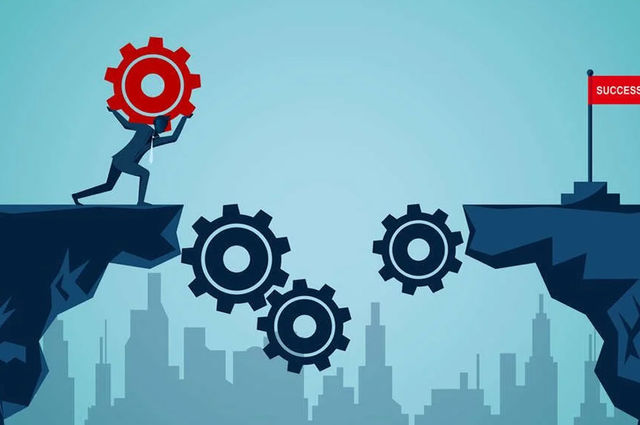Bridging the tech gap…What is Holding us Back?
14 experts shared their view
In a recently contributed article on Hospitality Net, I asked myself the question of why we see a slow pace of hotel groups upgrading to contemporary tech stacks. Innovative and open-architecture applications that the hospitality sector has long anticipated are now accessible, providing vast and flexible options ready to be deployed. From data analytics, digital transitions, and understanding revenue flows to business intelligence, everything is available at attractive SaaS pricing. Modern technology solutions available today have the potential to transform our industry into genuine tech and data-driven entities. Yet, the question remains: why haven't all made the shift instantly? What's holding us back?
Thanks to Michael Levie for a provocative question. My answers:
1) Money: Like the old adage about advertising (which 50% of my spend is responsible for my 50% wasted cost?), much of the world's senior management is not comfortable with AI or advanced tech spending - yet. This may be a combination of generational comfort and conservative spending during theser times.
2) Skills: Implementation of many of these newer technologies takes local skills to tweak, monitor and maintain. I'd guess that 1% of those in informational technology leadership at the property level worldwide have a level of skill necessary to deploy, monitor and maintain databases or interconnectivity issues.
3) Desire: Perhaps generational.
If it isn't broken, don't touch it.Not all of us are early adapters. I believe Geffrey Moore inCrossing the Chasmyears ago stated that only 2% of us are early adapters. This is an industry that in general seems to follow, not lead. We hear about the amazing new labor and cost-saving technologies but wait to see if they are as real as promoters present them.The solution lies in effective and accurate customer success stories, IT management education, and simple, incremental, and cost-effective senior management presentations.
There are many factors and its not the technologies itself. Budgets for sure are tight and The return on investment for these technologies may not be immediately apparent, leading to hesitation in adopting them, disruption to operations will come into play especially if its PMS related but probably the biggest factor is the human factor. We need more technology and digitally minded people sat around the table. There should be a digital transformation director in place, data experts employed and should be a number one company priority for sure. Furthermore, concerns about data security and privacy are paramount in the hotel industry, as they handle sensitive guest information. Implementing new technology can bring risks, and hotels need to be cautious in ensuring that guest data remains secure.
Last year hoteliers invested in technology less than 2.75% of room revenue (STR) - compare this to 15% for Expedia or Booking. Only through accelerated investments in technology - cloud, mobility, AI, robotics, IoT, etc. can the industry reduce staffing needs and unsustainable labor costs, and "appease" the exceedingly tech-savvy guests and their high tech expectations.
By investing in technology, hoteliers can reduce, on average, their staffing needs by 50% and afford to pay their employees living wages, train them better and empower them to provide stellar service.
What's holding us back?
- Reluctance to invest in technology, coming from the lack of understanding that we are serving technology-obsessed travel consumers who demand a hotel technological experience equal or better to what they have at home.
- Lack of proper technology education. How many hospitality schools today teach technology courses? Only a few. NYU Tisch Center for Hospitality offers "Current and Future Hospitality Technologies" graduate course since 2019.
- And finally, hospitality has become an industry of buzzwords and gadgets, Not investments in a well-thought out tech stack, but singular flashy applications in the hope of impressing guests and ownership. Ex. A property with 7-year old website and no CRM now has a robot.
The hospitality industry's hesitant approach to modern technologies is deeply rooted in three decades of reliance on outdated technologies.
In particular the PMS is the biggest hurdle of moving to newer technology. Even major hotel brands persist with legacy, all-in-one PMS that compromise the customer experience, and cause substantial delays in keeping up with industry trends and attaining a competitive edge.
However, the real hurdle doesn"t lie in the lack of cutting-edge solutions; it's the reluctance of both individuals and organisations to embrace change. While migrating from a legacy PMS to an open property management platform offers a compelling opportunity, true success requires a parallel transformation on an operational level in the organisation. Technology isn't a one-time investment; it's an ongoing process that requires top-down commitment to change. Blindly adopting new tools without a meticulous review risks missing potential benefits and invites failure.
Shining examples abound of modern tech-focused accommodation providers that revolutionise the hotel industry with a resilience to change. These innovators understand that embracing risk is integral to creating something truly innovative. Numa, Limehome, Mollie"s UK, STAYERY, mk Hotels, citizenM, and others exemplify the possibilities achievable today through open platforms delivering outstanding results for both guests and employees.
As we all often say, "Hospitality is a people industry." This highlights one of our greatest strengths in how we bring people from diverse backgrounds and geographies together, and create meaningful experiences for our guests. That also means it's a business deeply rooted in history, culture and relationships, and these are all things that are much harder to systemically change in one fell swoop when compared to other companies in newer industries like a tech startup/scaleup. So, just as hospitality is and will always be about people, this great advantage we have over other sectors can also be our Achilles heel when it comes to rapid change.
Most CEO's are not tech savvy. Their focus is on creating new brands or getting more hotels. It would be great to see how a OTA CEO would change the tech stack of a hotel group. I suppose creating a tech strategy at all would be number one.
At Hospitality Upgrade's Executive Vendor Summit, the CIO panel is a highlight. When asked about their IT strategy, all five CEOs replied that they had NONE! This was not surprising to me because the demand for hotel technology is dominated by problem solving. We need something for housekeeping, a new IBE, a cloud based PMS, a service bus ... A clear strategy with the guest in mind is missing.
For an OTA CEO it would be clear that the Golden Record should be the key element of the hotel's IT strategy and every tool must be connected to it. This is what differentiates the big data OTAs from the "fix the problem" approach that dominates our industry.
The solution: Senior management needs to become tech savvy, and understand the potential of data. The first step would be to create a guest-centric IT strategy where CDM, CRS and PMS share the same central profile.
Lots of reasons. The big chains are locked into their supplier relationships and would lose their big discounts if they jump, plus they have built other products that rely on their core systems, so would incur a big cost of change. Decisions are being made at owner/operator level based on value engineering - the site level GMs and IT team may not have a final say. In resort hotels, the incumbents have created a full ecosystem covering PMS, POS, spa, M&E, etc. They aren't best of breed anywhere, but they share a single customer record, so keep billing and marketing simpler. Many new best of breed PMS players don't link via API or otherwise to best of breed POS or spa or RMS players, so the risk moves to the client. Partner system marketplaces help, following the Salesforce Force.com App Store concept. The newer players need to build partner interfaces in advance of requirements.
It's good to think of technology adoption as a spectrum, not a black/white situation. Some hoteliers are very advanced, some are in the middle, and some are clearly lagging behind. For those, there are a few reasons:
- Business as usual is good enough. I'm doing a record year in revenue!
- It's hard to teach an old dog new tricks. That's why you typically see innovation when a new management team comes in, there's a change of generations running the business, etc.
- There's a minimum scale to make an effort worthwhile. So independent, small hotels have it harder.
- Fragmentation and speed of change in tech solutions make it challenging for a hotelier to understand the landscape and define her priorities.
Even so, I'd argue that almost any investment in hotel technology, at this stage, pays off. The move from "not doing something" to "doing something simple" brings immediate value; the proof is that, once a hotelier starts using some new technology, they almost never go back to the old method.
In the ever-evolving landscape of the travel and hospitality industry, the persistent need to sell and advocate for technology solutions underscores a broader issue: the industry's struggle to fully embrace these advancements. Despite the fact that these technologies are no longer "modern" but rather integral to competitiveness and efficiency, there remains a lack of entrenched understanding.
Several factors contribute to this hesitance. First, there's a reluctance to be pioneers or leaders in adopting new tech, often stemming from the fear of unforeseen challenges. Second, a prevalent lack of profound knowledge or appreciation for the transformative potential of technology persists. Third, there's a sense of uncertainty regarding the path forward and where to invest resources optimally. Lastly, the sheer complexity of integrating new technologies into legacy systems can be daunting.
This intricate web of challenges holds back progress in an industry where adaptability and innovation are paramount. However, it's vital to remember the age-old adage: "nothing ventured, nothing gained." While the journey towards technological transformation may be daunting, the rewards in terms of enhanced efficiency, customer experience, and competitive advantage are immense.
Experienced guidance through these obstacles and facilitation of successful adoption of technology is instrumental in turning uncertainty into opportunity.
Not all, but many, of the hotels we work with are holding onto their legacy property management systems. When it comes to full-scale digital transformation and cloud migration, there are genuine concerns about disruption and costs.
Those are the pinch points and the nature of the hotel business is a factor too: open 24/7, constantly customer-facing, with tight margins and pressure on staffing.
As participants in the hotel technology industry, we should acknowledge its shortcomings. There is a significant lack of regulation and transparency and, unfortunately, quite a few cowboys out there.
As consultants and vendors our focus is on the specific needs and requirements of our customers. If a hotel client wants a better way of collecting and accessing guest data, or a particular business intelligence tool, we can create integrations and customisations with whatever system the hotel has in place – whether on-premise or in the cloud.
Of course, we'd love more businesses to focus on long-term strategic projects rather than short-term fixes, but there is no value in us being judgemental.
We all live in the same world. It's not perfect and there is plenty of progress to make. What is required is practical, realistic, and empathetic collaboration.
Hotels commonly rely on Property Management Software (PMS) as their primary technological solution. However, the persistence of legacy on-premises PMS and POS systems, characterised by numerous guest profiles and data silos, presents significant challenges for businesses seeking to enhance their operational workflows and implement innovative strategies. The integration of advanced solutions into these outdated models often forces hotels to maintain multiple databases and dashboards, leading to a disjointed data flow and inconsistent workflows.
The key to leveraging modern technology effectively is not patching together various solutions through open APIs or data warehouses. Instead, it necessitates a comprehensive approach that centres on adopting an all-in-one solution capable of addressing the evolving landscape of data insights. This approach not only fosters streamlined and synchronised operations across different departments but also facilitates the seamless adoption of new technologies by employees, requiring minimal training.
I think that the main problem is not so much the technology-related costs (which are dropping) or technologies' capabilities (which are increasing) but the mentality of managers and employees. The we-have-always-done-it-this-way mentality is hurting the adoption of innovative technologies. Implementing new technologies that reorganise processes in hospitality companies means embarking on a long journey that leads to significant changes in the way managers and employees work. And most people do not want change. They will resist change because they are afraid that smart technologies will make them obsolete and they need to go outside of their comfort zone to learn new things in order to remain relevant. Second, using AI may lead to losing part of the control in decision-making (e.g. in hotel pricing) – something that managers do not wish to do. Third, artificial intelligence works best when coupled with natural intelligence. However, people often overtrust AI or are too sceptical towards technologies and both perspectives lead to failure in technology implementation. Overtrust inflates expectations towards technologies and leads to disappointment when technologies do not deliver them which holds new tech investments. Scepticism downgrades the potential tech performance and also holds back investments in new technologies.
Some hoteliers believe transitioning to the cloud is complicated and requires specialized knowledge, but if they rely on experienced and proven technology solutions partners with advanced data migration tools and mature cloud transition processes, moving to the cloud is straightforward.
So why are hoteliers still resistant? Cost concerns are probably the leading barrier, as many hoteliers don't take the time to understand the true costs of not moving to the cloud, which can be a major inhibitor in launching new initiatives or integrating essential new solutions. Others incorrectly believe their data is more secure in a server located at the hotel, rather than in the cloud.
Despite these challenges and concerns, many hospitality organizations are gradually adopting cloud technologies as they recognize the superior security, scalability, flexibility, cost-efficiency, and improved guest experiences the cloud can provide.
Oracle has helped ease and streamline the migration of hotel technology to the cloud with tools that can automate configuration and retain the historical data that is important to hotels. Oracle also provides eLearning and in-app guided learning to facilitate a more enjoyable and effective onboarding experience to guide hotels and brands through their transformation further.
Hotels have many concerns when making the switch to new technologies, one of which is a heightened concern about maintaining a smooth implementation during the transition from a legacy PMS system to a modern cloud PMS. Because the PMS is the 'heart' of a hotel's tech stack, even minor disruptions in a new platform's onboarding can potentially have disastrous consequences for a hotel's operations and level of service. This concern has only been exacerbated by the persistent labor shortages that have plagued the hotel industry in recent years.
The solution is to fundamentally reimagine the relationship between a technology provider and its customers. The role of a technology company must be more of a strategic partner, rather than a transactional vendor. This means providing dedicated support personnel at every stage of the customer lifecycle, from implementation to product support, client success, and future product development. It's also important for hotels to select PMS platforms that are user-friendly and intuitive to reduce employee training and onboarding costs.
Many hotels are also concerned that switching to a cloud-based PMS will result in a loss of core capabilities and a shift away from more traditional "high-touch" service. Fortunately, both of these assumptions arise from a misunderstanding about the nature of cloud technology. Cloud-based PMS systems were feature-light when they were first introduced around a decade ago, but today's modern cloud PMS platforms come with feature sets that often match legacy competitors with better usability. Instead of eliminating "high-touch" service, modern PMS platforms empower staff and promote guest engagement by allowing staff to move freely around the lobby, meeting guests wherever they are on the property. Unlike cluttered interfaces with confusing jargon, modernly designed platforms use clear designs and plain language, enabling staff to focus more on conversing with and serving guests and less time buried in their screens.
Hoteliers also worry about costs associated with switching to a cloud PMS. Fortunately, switching from on-site legacy systems to SaaS cloud platforms can be cost-effective and hassle-free. On-site servers demand high energy consumption, frequent maintenance, and costly software updates. Additionally, Legacy PMS providers often impose pricey, proprietary integrations, restricting system flexibility. In contrast, SaaS cloud platforms eliminate hidden costs, requiring no on-site hardware, manual assistance, or additional energy expenses. They offer seamless integration with third-party platforms, open APIs, free automatic software updates, and no system downtime, providing a more efficient and economical solution.















